#Zacchaeus the Tax Collector
Photo
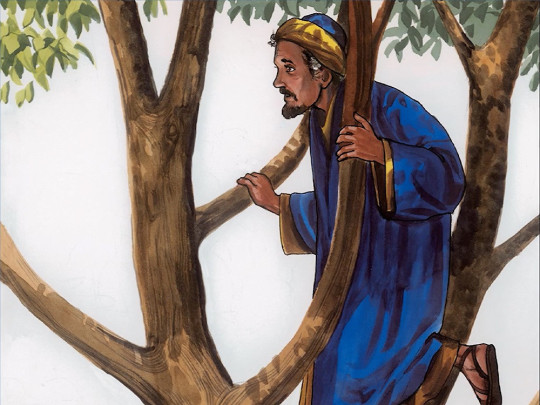
the Son of man is come to seek and to save that which was lost...
1 And Jesus entered and passed through Jericho.
2 And, behold, there was a man named Zacchaeus, which was the chief among the publicans, and he was rich.
3 And he sought to see Jesus who he was; and could not for the press, because he was little of stature.
4 And he ran before, and climbed up into a sycomore tree to see him: for he was to pass that way.
5 And when Jesus came to the place, he looked up, and saw him, and said unto him, Zacchaeus, make haste, and come down; for to day I must abide at thy house.
6 And he made haste, and came down, and received him joyfully.
7 And when they saw it, they all murmured, saying, That he was gone to be guest with a man that is a sinner.
8 And Zacchaeus stood, and said unto the Lord: Behold, Lord, the half of my goods I give to the poor; and if I have taken any thing from any man by false accusation, I restore him fourfold.
9 And Jesus said unto him, This day is salvation come to this house, forsomuch as he also is a son of Abraham.
10 For the Son of man is come to seek and to save that which was lost.
— Luke 19:1-10 | King James Version (KJV)
The King James Version Bible is in the public domain.
Cross References: Exodus 22:1; Leviticus 6:5; 1 Kings 10:27; 1 Chronicles 27:28; Ezekiel 34:12; Matthew 10:3; Matthew 18:11; Matthew 20:11; Mark 10:46; Mark 15:40; Luke 3:8; Luke 13:16; Luke 18:35; John 3:17
#Zacchaeus the Tax Collector#Jesus#sinners#salvation#son of Abraham#Gospel of Luke#New Testament#Luke 19:1-10#KJV#King James Bible
9 notes
·
View notes
Text
How many times did Jesus visit Jericho?
I suppose you could say at least twice but more likely 3 times or maybe more because these are the only times mentioned in scripture. The question you asked is a legitimate question. Matthew 20:29-34 tells us Jesus healed 2 blind men while Mark 10:46-52 and Luke 18:35-43 tell us it was 1. Only Mark chose to identify one of the beggars as Bartimaeus, perhaps because Bartimaeus was known to Mark’s…
View On WordPress
1 note
·
View note
Text
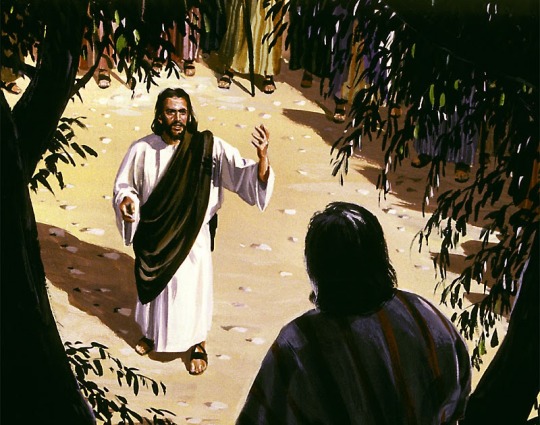
Encountering Christ:
A Life Transformed: Zacchaeus from Jericho!
Let us introduce you to Zacchaeus! You might remember him as the short tax collector from Jericho. Now, tax collectors in those days weren't exactly the most loved folks around. They were often seen as corrupt and greedy, taking advantage of their own people. But Zacchaeus's story takes a remarkable turn when Jesus comes into the picture.
One day, Zacchaeus heard that Jesus was passing through his town. Being short in stature, he couldn't see over the crowd, so he climbed a sycamore-fig tree just to catch a glimpse of Jesus. Imagine the surprise when Jesus stopped right under that tree and called Zacchaeus by name!
Jesus not only acknowledged Zacchaeus but invited himself to Zacchaeus's house. This encounter was a game-changer. Zacchaeus was deeply moved by Jesus's acceptance and grace. He decided to repent and change his ways. He pledged to give half of his possessions to the poor and promised to repay fourfold anyone he had cheated.
What's incredible is how Jesus's simple act of reaching out changed Zacchaeus's entire outlook. It shows us that no one is beyond redemption or beyond the reach of God's love. Jesus saw Zacchaeus not for who he was, but for who he could become.
This story reminds us that encountering Christ isn't just about hearing stories or saying prayers—it's about being transformed from the inside out. It's about finding new purpose and direction, just like Zacchaeus did.
Questions
How can Zacchaeus's encounter with Jesus inspire us to show radical hospitality and acceptance to those around us, especially those who might feel marginalized or judged?
Reflecting on Zacchaeus's transformation, what areas in our own lives do we need to repent and make amends, just as Zacchaeus did with his dishonest practices?
In what ways can we actively seek out encounters with Jesus in our daily lives, like Zacchaeus did by climbing the tree, to experience personal transformation and renewed purpose?
Prayer:
Heavenly Father,
Thank you for the inspiring story of Zacchaeus, a reminder of your transformative power and unconditional love. We come before you with open hearts, seeking to emulate Zacchaeus's response to encountering Jesus.
Lord, help us to see others with the same compassion and acceptance that Jesus showed Zacchaeus. Teach us to extend radical hospitality and genuine love to those who need it most.
Father, reveal to us the areas in our lives where we need to repent and make things right, just as Zacchaeus did. Give us the courage to take steps toward reconciliation and restitution.
Above all, Lord, ignite in us a deep desire to encounter Jesus daily. May we climb the figurative tree of faith, seeking moments of connection and transformation with you. Let our encounters with Jesus reshape our hearts, minds, and actions, aligning them more closely with your will.
We pray for transformed lives, inspired by Zacchaeus's story, and for the courage to live out our faith boldly. In Jesus's name, we pray.
Amen.
#Prayer#EncounterWithJesus#TransformedLives#EncounterWithChrist#BibleStories#christian faith#jesus christ#bible scripture#bible#christianlife#bible verse#faith#christianity#faith in jesus#christ#christian blog#christianty#christianencouragement#christian living#bible quote#bible study#holy bible#bible story#biblestudy#christian#bible reading#bible character#daily bible study#daily bible reading#daily scripture
23 notes
·
View notes
Photo
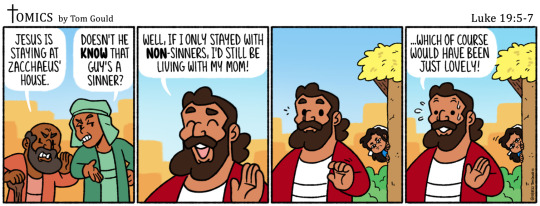
10/28/2022
I'm sure she's an immaculate roommate!
___
JOKE-OGRAPHY:
In this Bible story, Jesus decides to stay at the house of the tax-collector, Zacchaeus, who has repented of his greedy ways. Some onlookers wonder why someone as holy as Jesus would stay at a sinner's house. In this cartoon, Jesus says that, if He couldn't stay with sinners, He'd have to live with His mom forever (because Catholics believe that Mary was sinless). He says this as if it would be a bad thing, so when He catches sight of His holy mother eavesdropping from behind a nearby house, He quickly amends His statement so He doesn't hurt her feelings.
AUTHOR'S NOTE:
This is yet ANOTHER Tomics Resurrection, where an old comic that has long suffered the cruelties of time is sent to the pasture to be... taken care of... while a new comic takes its place! Here's the old version for comparison:
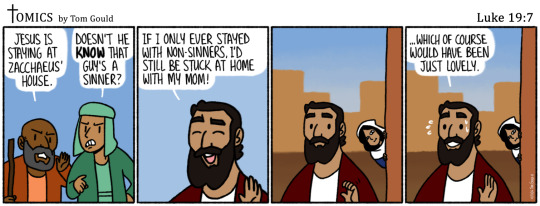
#jesus#mary#virgin mary#blessed virgin mary#random guys complaining about other people like they dont have manual labor or fishing or something to do in ye oldene biblicale thymes#bible#tom#gould#tomics#tomicscomics#tomgould#catholic#christian#cartoon#comic#eavesdropping isnt a sin if youre just checking on your beloved son
502 notes
·
View notes
Text

Luke 19:1-10 (FBV). “Jesus entered Jericho and walked through the town. A man was there named Zacchaeus, a chief tax collector. He was very rich. He wanted to see who Jesus was, but because he was short he couldn't see over the crowd. So he ran ahead, and climbed up a sycamore tree to see Jesus as he passed by. When Jesus got there, he looked up and said, “Zacchaeus, come down quickly! I need to stay at your house today.” Zacchaeus climbed down quickly and was so happy to welcome Jesus to his home. When the people saw this they all complained, “He's gone to stay with such a sinner!” But Zacchaeus stood up and said before the Lord, “Look, I'm giving half of everything I own to the poor, and if I've cheated anybody, I'll pay them back four times as much!” In response Jesus said, “Today salvation has come to this house, because this man has shown he is a son of Abraham too. For the Son of man came to search for and save those who are lost.”
“Jesus Is Hospitable” by In Touch Ministries:
“Ask the Lord to help you see those who need your welcome today.”
“Even though Jesus had no home to call His own, the Gospel accounts reveal His ability to make others feel at home in His presence. Wherever the Lord went, He intentionally welcomed those with open hearts and “ears to hear”—including sinners and tax collectors—into the household and family of God.
Although Zacchaeus was a tax collector well known for extortion, Jesus countered his sin with generosity. In this way, the Lord showed that true hospitality doesn’t come from material resources, but from a heart that sees and serves others with God’s love. “Hurry and come down, for today I must stay at your house,” Jesus declared as He looked up at the tree where the man had climbed for a better view (Luke 19:5). Imagine Zacchaeus’ surprise to find that Jesus sought him out, even though he was in an unlikely place. This is true for us, too; no matter how small or unnoticed we may feel, God sees us and loves us.
Jesus’ hospitality prompted Zacchaeus’ own display of generous hospitality. When we show others that we see them and God sees them too, hearts and lives are transformed. Understanding and embracing God’s hospitality toward us—no matter how great our sin—enables us to extend that same hospitality to others as we invite them to join us at Jesus’ table.”
(Photo by Chris Nemeth at Unsplash)
#luke 19:1-10#god loves you#bible verses#bible truths#bible scriptures#bible quotes#bible study#studying the bible#the word of god#christian devotionals#daily devotions#bible#christian blog#god#belief in god#faith in god#jesus#belief in jesus#faith in jesus#christian prayer#christian life#christian living#christian faith#christian inspiration#christian encouragement#christian motivation#christianity#christian quotes#in touch ministries#keep the faith
14 notes
·
View notes
Text
Quiet Time 4/5
What am I feeling today?
I’m feeling alright, I was quite productive yesterday which was good! I’m a little anxious of what today will bring but I look forward to it anyways! Hope to be in the OR this morning but whichever unit I’m floated to is sure to be enjoyable🤗
Luke 19 NIV
(v. 8-10) “But Zacchaeus stood up and said to the Lord, “Look, Lord! Here and now I give half of my possessions to the poor, and if I have cheated anybody out of anything, I will pay back four times the amount.” Jesus said to him, “Today salvation has come to this house, because this man, too, is a son of Abraham. For the Son of Man came to seek and to save the lost.””
Zacchaeus was a tax collector and some people were judging that Jesus would be eating with a sinner. But here we see that he was willing to give up his possessions and Jesus rewarded him. Also the last line is so crucial! Jesus came to seek and save the lost!!
(v. 35-40) “They brought it to Jesus, threw their cloaks on the colt and put Jesus on it. As he went along, people spread their cloaks on the road. When he came near the place where the road goes down the Mount of Olives, the whole crowd of disciples began joyfully to praise God in loud voices for all the miracles they had seen: “Blessed is the king who comes in the name of the Lord!” “Peace in heaven and glory in the highest!” Some of the Pharisees in the crowd said to Jesus, “Teacher, rebuke your disciples!” “I tell you,” he replied, “if they keep quiet, the stones will cry out.””
I really like this last line. Because obviously that people of the crowd are praising him as we are His creation and meant to give praise. But Jesus is here saying that even if the people were quiet, the stones (and I interpret this as all of God’s creation) would cry out! I just think that’s powerful, that all things are meant to praise the Lord!
(v. 41-44) “As he approached Jerusalem and saw the city, he wept over it and said, “If you, even you, had only known on this day what would bring you peace—but now it is hidden from your eyes. The days will come upon you when your enemies will build an embankment against you and encircle you and hem you in on every side. They will dash you to the ground, you and the children within your walls. They will not leave one stone on another, because you did not recognize the time of God’s coming to you.””
he wept :( I appreciate these moments because it humanizes Jesus. He was human, he had emotions, he cried, he did all things that we do as well and we’re so lucky to have the Lord know what it’s like to be us. He loved the perfect life and our aim should be to imitate him in every way.
(v. 47-48) “Every day he was teaching at the temple. But the chief priests, the teachers of the law and the leaders among the people were trying to kill him. Yet they could not find any way to do it, because all the people hung on his words.”
It’s just really intense when you think about it. They wanted to kill him. They were set on that. Every really early on and it’s quite disturbing really for them to pursue it so much to the point that they finally made it happen. And what a gruesome death it was :(
#bible#quiet time#bible quote#bible scripture#bible verse#christian blog#christian faith#christian living#christianity#faith in jesus#bible study#devo#faith#faith in god#jesus#devotional#disciple of christ#daily devotional#discipleship#jesus saves#jesus loves you#love#christian#saras devotionals#4/5
9 notes
·
View notes
Text

Sunday of the Publican and the Pharisee Beginning of the Lenten Triodion
Commemorated on February 25
Let us flee from the pride of the Pharisee! And learn humility from the Publican’s tears! Let us cry to our Savior, have mercy on us, only merciful One!
The Sunday after the Sunday of Zacchaeus is devoted to the Publican and the Pharisee. At Vespers the night before, the Triodion (the liturgical book used in the services of Great Lent) begins.
Two men went to the Temple to pray. One was a Pharisee who scrupulously observed the requirements of religion: he prayed, fasted, and contributed money to the Temple. These are very good things, and should be imitated by anyone who loves God. We who may not fulfill these requirements as well as the Pharisee did should not feel entitled to criticize him for being faithful. His sin was in looking down on the Publican and feeling justified because of his external religious observances.
The second man was a Publican, a tax-collector who was despised by the people. He, however, displayed humility, and this humility justified him before God (Luke 18:14).
The lesson to be learned is that we possess neither the Pharisee’s religious piety, nor the Publican’s repentance, through which we can be saved. We are called to see ourselves as we really are in the light of Christ’s teaching, asking Him to be merciful to us, deliver us from sin, and to lead us on the path of salvation.
Two weeks before the beginning of the Fast, as part of our preparation for Great Lent, Holy Week, and Pascha, the Church prescribes the reading of Saint Mark's Gospel. From Monday to Friday the focus is on the end times, and the Savior's death and burial.
[Text from OCA]
5 notes
·
View notes
Text
Saints&Reading: Sunday, February 18, 2024
february 5_february 18
The sunday of Zacchaeus
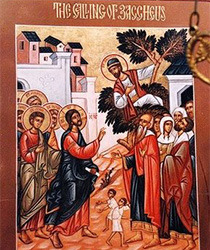
The paschal season of the Church is preceded by the season of Great Lent, which is also preceded by its own liturgical preparation. The first sign of the approach of Great Lent comes five Sundays before its beginning. On this Sunday the Gospel reading is about Zacchaeus the tax-collector. It tells how Christ brought salvation to the sinful man, and how his life was changed simply because he “sought to see who Jesus was” (Luke 19:3). The desire and effort to see Jesus begins the entire movement through Lent towards Pascha. It is the first movement of salvation.
Our lenten journey begins with a recognition of our own sinfulness, just as Zacchaeus recognized his. He promised to make restitution by giving half of his wealth to the poor, and by paying to those he had falsely accused four times as much as they had lost. In this, he went beyond the requirements of the Law (Ex. 22:3-12).
The example of Zacchaeus teaches us that we should turn away from our sins, and atone for them. The real proof of our sorrow and repentance is not just a verbal apology, but when we correct ourselves and try to make amends for the consequences of our evil actions.
We are also assured of God’s mercy and compassion by Christ’s words to Zacchaeus, “Today salvation has come to this house” (Luke 19:9). After the Great Doxology and Trisagion at Sunday Matins (when the Tone of the week is in Tone 1, 3, 5, or 7) we sing the Troparion of the Resurrection: “Today salvation is come to the world, let us sing praises to Him Who arose from the tomb, and is the Author of our life. For having destroyed death by death, He has given us the victory and great mercy.”
Zacchaeus was short, so he climbed a tree in order to see the Lord. All of us have sinned and come short of the glory of God (Rom. 3:23). We are also short in our spiritual stature, therefore we must climb the ladder of the virtues. In other words, we must prepare for spiritual effort and growth.
Saint Zacchaeus is also commemorated on April 20.
THE HOLY MARTYR AGATHA of PALERMO ( 251)
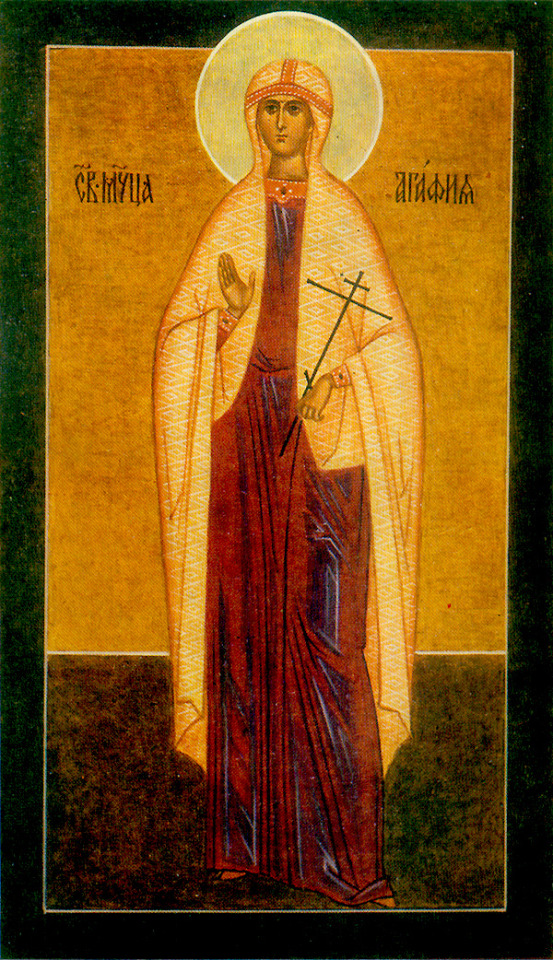
The Holy Virgin Martyr Agatha was the fifteen-year-old daughter of rich and respected Christian parents from the city of Palermo (formerly Panormos) in Sicily. During the persecution under the emperor Decius (249-251), the city prefect of Catania, Quintianus, having heard about Agatha’s wealth and beauty, sent his soldiers after her to bring her to trial as a Christian.
At Catania they housed the saint with a certain rich woman, who had five daughters. They all attempted to tempt Saint Agatha with fine clothes, amusements and entertainment, urging her to offer sacrifice to the pagan gods, but the saint disdained all these things. The more they tried to move her, the more resolute she became. She prayed that she might soon face martyrdom.
During her interrogation under Quintianus, the holy martyr was swayed neither by the flattery, nor by the threats, and she was subjected to cruel torments. They also tried to remove her breasts with metal tongs, and when this failed, they used knives.
The holy Apostle Peter appeared to her in prison and healed her wounds. Saint Agatha was led to torture again, and Quintianus was astonished to see her completely healed, with no trace of cutting. Then the torture began once more.
At this moment an earthquake took place in the city, and many buildings were destroyed. Among those killed were two of Quintianus’s advisors. The terrified inhabitants rushed to Quintianus, demanding an end to Agatha’s tortures. Fearing a revolt by the people, Quintianus sent Saint Agatha back to prison. There the martyr, offering thanks to God, peacefully surrendered her soul to the Lord.
SAINT THEODOSIUS, ARCHBISHOP OF CHERNIGOV (1696)
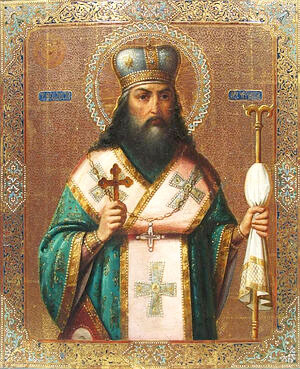
Saint Theodosius, Archbishop of Chernigov, was born in the seventeenth century at the beginning of the decade of the thirties in Podolsk governance. He was descended from a noble family, the Polonitsky-Uglitskys. His parents were the priest Nikḗtas and Maria. The saint was taught Christian piety in his parents’ home, and this piety remained with him throughout his life.
From childhood he was distinguished by a fervent love for God and zeal for the Church. The innate abilities of the youth came to light in the Kiev Brotherhood school at Kiev’s Theophany monastery. The school was flourishing at the end of the 1640s, when its rectors were Archimandrite Innocent (Gizel), and Igumen Lazar (Baranovich), who later became Archbishop of Chernigov. Among its instructors were: Hieromonk Epiphanius (Slavinetsky), Hieromonk Arsenius (Satanovsky), Bishop Theodosius (Baevsky) of Belorus, Igumen Theodosius (Saphonovich) and Meletius Dzik. These were the enlightened men of those days. The comrades of Saint Theodosius at the school would become future outstanding pastors: Simeon Polotsky, Joannicius Golyatovsky, Anthony Radivillovsky, Barlaam Yasninsky. The Kiev Brotherhood Theophany school was the chief center in the struggle of Orthodoxy against the assaults of Catholic clergy, particularly the Jesuits.
Saint Theodosius grew to spiritual maturity near the relics of Saints Anthony and Theodosius and other God-pleasers of the Kiev Caves, and he tried to imitate their holy life as much as he could. He devoted all his free time to prayer, meditation on God, and the reading of Holy Scripture.
It might be surmised that the saint did not finish the full course of studies, since the school ceased its activity for several years following the devastation of Podolia by the Poles. All his life the saint had a deep regard for the Kiev Brotherhood monastery where he was educated. In the Synodikon of the Kiev-Vydubitsk monastery is the following comment about Saint Theodosius: “He was a man of fine intellect, and generous to the Kiev Brotherhood monastery.”
Upon receiving his education, the future hierarch received monastic tonsure at the Kiev Caves Lavra with the name Theodosius, in honor of Saint Theodosius of the Caves (May 3).
Metropolitan Dionysius (Balaban) of Kiev made him archdeacon of Kiev’s cathedral of Holy Wisdom (Hagia Sophia) , and then appointed him steward of the episcopal household. Soon he left Kiev and went to the distant Krupitsky monastery near Baturino (in the Chernigov diocese), which was famed for its strict monastic life. There he was ordained to the holy priesthood, but remained there only a short time.
In 1662, Saint Theodosius was appointed Igumen of the Korsun monastery in Kiev diocese, and in the year 1664 he was made head of the ancient Kiev-Vydubitsky monastery. This monastery had fallen into the hands of the Uniates and Poles at the beginning of the seventeenth century and was in complete ruin. Thanks to the energy and initiative of Saint Theodosius, the Vydubitsky Mikhailovsk monastery was quickly restored.
He was particularly concerned with the order of church services. He formed an excellent choir, which was famed not only in Little Russia, but also in Moscow. Saint Theodosius sent his singers to Moscow in 1685 to instruct their choirs in Kievan chant.
As a strict ascetic himself, Saint Theodosius was concerned with the spiritual growth of his monks. He founded a small skete on the island of Mikhailovschina, not far from the monastery, for brethren wishing to live in solitude. He appointed the hieromonk Job (Opalinsky), one of the most zealous monks of his monastery, to organize and administer the skete.
Saint Theodosius had to live through some quite difficult days, enduring many sorrows. He and other Igumens were accused by Bishop Methodius of Mstislav and Orshansk of betraying Russia in a supposed correspondence with the enemies of Russia.
On September 20, 1668 Saint Theodosius explained the matter. On November 17, 1668 the lie was exposed, and Saint Theodosius together with the other Igumens were vindicated. Archbishop Lazar (Baranovich) esteemed the high spiritual qualities of Saint Theodosius and befriended him. He called him “a sheep of the flock of Christ, teaching by humility,” and he prophetically expressed the wish that the name of Saint Theodosius might be inscribed in Heaven.
When Archbishop Lazar became locum tenens of Kiev’s Metropolitan See in 1689, he appointed Saint Theodosius as his vicar in Kiev, while he remained at Chernigov. In his capacity as vicar of the locum tenens of the Kiev Metropolitan See, Saint Theodosius had an active role in many churchly events. In 1685 he participated with the right of a decisive vote in the election of Bishop Gideon (Chetverinsky) as Metropolitan of Kiev, and he was sent to Moscow with news of this event with Igumen Jerome (Dubin) of Pereyaslavl . In Moscow, both representatives were received with honor and esteem. Indeed, the result of this delegation was the reuniting of the Kiev Metropolitan See with the Russian Orthodox Church.
In 1688 Saint Theodosius was appointed archimandrite of Chernigov’s Eletsy monastery, replacing the deceased Archimandrite Joannicius (Golyatovsky). In appointing Saint Theodosius, Archbishop Lazar told him to spare no effort in placing the Eletsy monastery in good order. This monastery had not yet been set aright after the expulsion of the Jesuits and Dominicans, and it was in great disorder.
Through the efforts of Saint Theodosius, in his two or three years as igumen, the monastery’s revenues and properties increased, the church of the Dormition was repaired, and the Elets Icon (February 5) was enshrined there.
In his new position, the saint also assisted Archbishop Lazar in many important matters. He participated in drafting a conciliar reply to Patriarch Joachim of Moscow in response to his questions about the attitude of the Kiev Metropolitan See to the Council of Florence, and its judgment on the question of the transformation of the Holy Gifts as accepted by this Florentine Council. When the Patriarch proved to be unsatisfied by these answers, the Baturino Igumen Saint Demetrius (the future Metropolitan of Rostov) was sent to him at the beginning of 1689. Saint Theodosius journeyed with him as the representative of Archbishop Lazar. He was entrusted with the delivery of a letter to the Patriarch, and to clear up the misunderstandings.
Because of his poor health, Archbishop Lazar wished to see Saint Theodosius consecrated to the episcopate, seeing in the saint a worthy successor to himself. On September 11, 1692 the election of Saint Theodosius as Archbishop of Chernigov was confirmed, and he was consecrated in the Dormition cathdral of the Moscow Kremlin two days later.
Little information regarding Saint Theodosius’s administration of the Chernigov diocese has been preserved. The saint worked incessantly to raise the level of true Christian piety in his flock. He also focused on maintaining old monasteries, and founding new communities.
At the very beginning of his episcopate, the the Pecheniksk women’s monastery was established with his blessing, and he himself consecrated the monastery church in honor of the Dormition of the Most Holy Theotokos.
In 1694, a skete was founded near Liubech. The same year, at the Domnitsky men’s monastery, the saint consecrated a temple in honor of the Nativity of the Most Holy Theotokos. In the summer of 1695, he consecrated a majestic temple in honor of the Most Holy Theotokos, on the summit of Boldino Hill, near the ancient monastery of Saint Elias. Under Saint Theodosius there was a special enthusiasm for and strengthening of monasticism in the Chernigov diocese.
The saint also devoted much attention to the clergy, and he tried to choose worthy candidates for the priesthood. He also encouraged the pastoral education of the Chernigov clergy. He invited learned monks from Kiev, among whom was Saint John (Maximovitch), the future Metropolitan of Tobolsk (June 10), and also a helper and successor of Saint Theodosius in organizing the Chernigov clergy school.
Strict uprightness in regard to clergy and flock, deep compassion, concern and Christian love of peace were distinguishing features in the activity of Saint Theodosius. Not only did the Orthodox turn to him for help and advice, but even persons of other confessions.
Saint Theodosius did not remain with his Chernigov flock very long. Sensing the approach of death, he summoned the administrator of the Briansk Svensk monastery, Saint John (Maximovitch), and appointed him Archimandrite of the Chernigov Elets monastery.
Saint Theodosius died on February 5, 1696, and was buried in Chernigov’s Saints Boris and Gleb cathedral church, in a special crypt near the right cleros. His successor Saint John (Maximovitch), who was healed of a grievous illness by Saint Theodosius, later placed a stone plaque over his grave with a poetic inscription in gratitude for the saint’s help. The special grace which Saint Theodosius attained is shown by his ascetic life and his assistance to all who turn to him in prayer.
The glorification of Saint Theodosius occurred on September 9, 1896.
Source: Orthodox Church in America_OCA


1 TIMOTHY 4:9-15
9 This is a faithful saying and worthy of all acceptance. 10 For to this end we both labor and suffer reproach, because we trust in the living God, who is the Savior of all men, especially of those who believe. 11 These things command and teach. 12 Let no one despise your youth, but be an example to the believers in word, in conduct, in love, in spirit, in faith, in purity. 13 Till I come, give attention to reading, to exhortation, to doctrine. 14 Do not neglect the gift that is in you, which was given to you by prophecy with the laying on of the hands of the eldership. 15 Meditate on these things; give yourself entirely to them, that your progress may be evident to all.
LUKE 19:1-10
1 Then Jesus entered and passed through Jericho. 2 Now behold, there was a man named Zacchaeus who was a chief tax collector, and he was rich. 3 And he sought to see who Jesus was, but could not because of the crowd, for he was of short stature. 4 So he ran ahead and climbed up into a sycamore tree to see Him, for He was going to pass that way. 5 And when Jesus came to the place, He looked up and saw him, and said to him, "Zacchaeus, make haste and come down, for today I must stay at your house." 6 So he made haste and came down, and received Him joyfully. 7 But when they saw it, they all complained, saying, "He has gone to be a guest with a man who is a sinner." 8 Then Zacchaeus stood and said to the Lord, "Look, Lord, I give half of my goods to the poor; and if I have taken anything from anyone by false accusation, I restore fourfold." 9 And Jesus said to him, "Today salvation has come to this house, because he also is a son of Abraham; 10 for the Son of Man has come to seek and to save that which was lost.
#orthodoxy#orthodoxchristianity#easternorthodoxchurch#originofchristianity#spirituality#holyscriptures#gospel#bible#wisdom#saints
3 notes
·
View notes
Photo
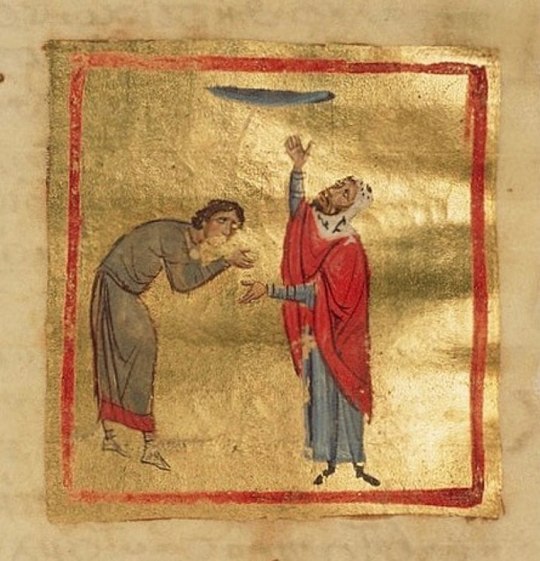
The Sunday after the Sunday of Zacchaeus is devoted to the Publican and the Pharisee. At Vespers the night before, the Triodion (the liturgical book used in the services of Great Lent) begins. Two men went to the Temple to pray. One was a Pharisee who scrupulously observed the requirements of religion: he prayed, fasted, and contributed money to the Temple. These are very good things, and should be imitated by anyone who loves God. We who may not fulfill these requirements as well as the Pharisee did should not feel entitled to criticize him for being faithful. His sin was in looking down on the Publican and feeling justified because of his external religious observances. The second man was a Publican, a tax-collector who was despised by the people. He, however, displayed humility, and this humility justified him before God (Luke 18:14). The lesson to be learned is that we possess neither the Pharisee’s religious piety, nor the Publican’s repentance, through which we can be saved. We are called to see ourselves as we really are in the light of Christ’s teaching, asking Him to be merciful to us, deliver us from sin, and to lead us on the path of salvation. Two weeks before the beginning of the Fast, as part of our preparation for Great Lent, Holy Week, and Pascha, the Church prescribes the reading of Saint Mark's Gospel. From Monday to Friday the focus is on the end times, and the Savior's death and burial. https://www.instagram.com/p/CoQY7E8hR8U/?igshid=NGJjMDIxMWI=
19 notes
·
View notes
Text
youtube
JESUS, (English), Jesus and Zaccheus
"Jesus enters the town surrounded by crowds pushing in on Him. Zacchaeus, a short man, tries to see Jesus. But he can't see above the crowds or get through them. He climbs a tree. Jesus calls out to him. He tells Zacchaeus to come down from the tree because He wants to have dinner with him. People are appalled. Zacchaeus is the town tax collector. But Zacchaeus is more than happy. He comes down from the tree and leads the way."
3 notes
·
View notes
Text
Luke 19:1-10 NKJV
[1] Then Jesus entered and passed through Jericho. [2] Now behold, there was a man named Zacchaeus who was a chief tax collector, and he was rich. [3] And he sought to see who Jesus was, but could not because of the crowd, for he was of short stature. [4] So he ran ahead and climbed up into a sycamore tree to see Him, for He was going to pass that way. [5] And when Jesus came to the place, He looked up and saw him, and said to him, “Zacchaeus, make haste and come down, for today I must stay at your house.” [6] So he made haste and came down, and received Him joyfully. [7] But when they saw it, they all complained, saying, “He has gone to be a guest with a man who is a sinner.” [8] Then Zacchaeus stood and said to the Lord, “Look, Lord, I give half of my goods to the poor; and if I have taken anything from anyone by false accusation, I restore fourfold.” [9] And Jesus said to him, “Today salvation has come to this house, because he also is a son of Abraham; [10] for the Son of Man has come to seek and to save that which was lost.”
2 notes
·
View notes
Text

The attributes of God:
The goodness of God part 2/2
In Part 1 we defined an attribute of God as something of His own nature that He has revealed to us. We then looked at several ways by which God has revealed His goodness to us.
Once we recognise the goodness of God: what next? We can give one of two responses to the goodness of God, which are 1.the right response, and 2. the wrong response.
The wrong response: by the rich young ruler
Matthew 19:16 Now behold, one came and said to Him, “Good Teacher, what good thing shall I do that I may have eternal life?” 17 So He said to him, “Why do you call Me good? No one is good but One, that is, God. But if you want to enter into life, keep the commandments.” 18 He saith unto him, Which? Jesus said, Thou shalt do no murder, Thou shalt not commit adultery, Thou shalt not steal, Thou shalt not bear false witness,19 Honour thy father and thy mother: and Thou shalt love thy neighbour as thyself.20 The young man saith unto him, All these things have I kept from my youth up: what lack I yet? 21 Jesus said unto him, If thou wilt be perfect, go and sell that thou hast, and give to the poor, and thou shalt have treasure in heaven: and come and follow me.
22 But when the young man heard that saying, he went away sorrowful: for he had great possessions.
The story of the rich young ruler (RYR): we only arrive at a composite description of the RYR by reading sections of Matthew, Mark, and Luke.
This story can be used to teach many different biblical truths. Today we want to recognise that the RYR called Jesus ‘Good’ and wanted to know which good works would give him salvation.
Jesus seems to meet him where he is and tells him to keep the commandments of the Law of Moses, but which ones the RYR replies. Jesus gives him a list.
The RYR replies that he has kept all these commandments since his early youth.
Jesus identifies the RYR real problem that he is caught up with his status and wealth and
bids him to sell his property, give to the poor and follow Jesus.
The RYR went away very sorrowful for he was not prepared to give up his wealth to follow Jesus.
The right response to the goodness of God: Zacchaeus
Luke 19:1 Then Jesus entered and passed through Jericho. 2 Now behold, there was a man named Zacchaeus who was a chief tax collector, and he was rich. 3 And he sought to see who Jesus was, but could not because of the crowd, for he was of short stature. 4 So he ran ahead and climbed up into a sycamore tree to see Him, for He was going to pass that way. 5 And when Jesus came to the place, He looked up and saw him, and said to him, “Zacchaeus, make haste and come down, for today I must stay at your house.”
Zacchaeus was a chief tax collector and whose business gave him lots of opportunity to cheat and defraud those from whom he collected taxes.
Jesus saw 'wee' Zacchaeus atop a sycamore tree. Jesus tells Zacchaeus to climb down the tree for Jesus wants to be his houseguest.
Luke 19: 6 So he made haste and came down and received Him joyfully. 7 But when they saw it, they all complained, saying, “He has gone to be a guest with a man who is a sinner.”
8 Then Zacchaeus stood and said to the Lord, “Look, Lord, I give half of my goods to the poor; and if I have taken anything from anyone by false accusation, I restore fourfold.”
9 And Jesus said to him, “Today salvation has come to this house, because he also is a son of Abraham; 10 for the Son of Man has come to seek and to save that which was lost.”
No good deed goes unpunished and when Zacchaeus slid joyfully down the tree the bystanders were complaining that Zacchaeus was a sinner implying that Jesus had made an unworthy choice in Zacchaeus.
When the goodness of God came to Zacchaeus he received Jesus joyfully, and unlike the RYR began to give away his fortune, giving half his wealth to the poor and offering to restore any financial misdeeds multiplied times four.
What a difference between the RYR and Zacchaeus, the former would not let go of his wealth and did not follow Jesus, whereas the latter made generous financial restitution to his customers and began to follow Jesus.
What is your response to the goodness of God today?
¨ Be joyful.
¨ Be thankful.
¨ Be willing to share what we have and put wrong our misdeeds.
We first encountered the goodness of God at the point of our salvation. But almost every day we can see the goodness of God at work in our own lives and those of others. We can see the goodness of God in his daily provision, protection and blessing etc.
Conclusion The main point is that our God, the God of the bible is good, He is friendly towards us because we are His people. Whenever we come to God in praise, worship, thanksgiving, or petition we must never forget that the goodness of God affects our every interaction with Him.
Taste and see that the Lord is good!
God shows His goodness to us in many ways as seen in this psalm;
Psalm 103 Bless the Lord, O my soul: and all that is within me, bless his holy name.
2 Bless the Lord, O my soul, and forget not all his benefits:
3 Who forgiveth all thine iniquities, who healeth all thy diseases.
4 Who redeemeth thy life from destruction, who crowneth thee with lovingkindness and tender mercies.
5 Who satisfieth thy mouth with good things; so that thy youth is renewed like the eagle's.
Amen
Personal Prayer
#christianity#bible study#bibletruth#blog post#blessings#psalmonesermons#faith#victory#the goodness of god#the Rich Young Ruler vs Zacchaeus
3 notes
·
View notes
Text
Today's Gospel reading was the story of Zacchaeus, a wealthy tax collector who pledged half of his wealth to the poor and promised to pay 4x back to anyone whom he had defrauded
I recently read "My Body Is Not A Prayer Request" by Dr. Amy Kenny, which was really good, and she mentions the hypothesis that Zacchaeus was a little person (he was too short to see over the crowd, so he climbed a tree in order to be able to see Jesus)
That added a lot more imagery to the way I imagined the story
14 notes
·
View notes
Text

Luke 19:1-10 (FBV). “Jesus entered Jericho and walked through the town. A man was there named Zacchaeus, a chief tax collector. He was very rich. He wanted to see who Jesus was, but because he was short he couldn't see over the crowd. So he ran ahead, and climbed up a sycamore tree to see Jesus as he passed by. When Jesus got there, he looked up and said, “Zacchaeus, come down quickly! I need to stay at your house today.” Zacchaeus climbed down quickly and was so happy to welcome Jesus to his home. When the people saw this they all complained, “He's gone to stay with such a sinner!” But Zacchaeus stood up and said before the Lord, “Look, I'm giving half of everything I own to the poor, and if I've cheated anybody, I'll pay them back four times as much!” In response Jesus said, “Today salvation has come to this house, because this man has shown he is a son of Abraham too. For the Son of man came to search for and save those who are lost.”
“Jesus Is Hospitable” by In Touch Ministries:
“Ask the Lord to help you see those who need your welcome today.”
“Even though Jesus had no home to call His own, the Gospel accounts reveal His ability to make others feel at home in His presence. Wherever the Lord went, He intentionally welcomed those with open hearts and “ears to hear”—including sinners and tax collectors—into the household and family of God.
Although Zacchaeus was a tax collector well known for extortion, Jesus countered his sin with generosity. In this way, the Lord showed that true hospitality doesn’t come from material resources, but from a heart that sees and serves others with God’s love. “Hurry and come down, for today I must stay at your house,” Jesus declared as He looked up at the tree where the man had climbed for a better view (Luke 19:5). Imagine Zacchaeus’ surprise to find that Jesus sought him out, even though he was in an unlikely place. This is true for us, too; no matter how small or unnoticed we may feel, God sees us and loves us.
Jesus’ hospitality prompted Zacchaeus’ own display of generous hospitality. When we show others that we see them and God sees them too, hearts and lives are transformed. Understanding and embracing God’s hospitality toward us—no matter how great our sin—enables us to extend that same hospitality to others as we invite them to join us at Jesus’ table.”
(Photo by Chris Nemeth at Unsplash)
8 notes
·
View notes
Text

Jesus could have pointed Zacchaeus out and condemned him in front of the crowd (Luke 19). That would have pleased the crowd and shamed Zacchaeus, a tax collector whom many considered a traitor in service of Rome. But at least in public, Jesus did nothing but bless Zacchaeus. He refused to shame the sinner. He clothed him instead with honor.
That goes against our instincts. We think rebuking people for mistakes is more likely to provoke their repentance than honoring them would. But it’s the kindness of God that leads to repentance more often than his sternness does (Romans 2:4). Jesus came with tenderness and compassion, as a doctor tends to the sick. And the spiritually sick responded with openness and trust.
That speaks volumes about how we should treat people who have wronged us. A rebuke may feel satisfying, but it will do nothing but harden the heart of the offender. It also ignores the fact that at some level, every one of us is an offender. We aren’t exactly in a position to point fingers.
Live with the kind of grace Jesus showed Zacchaeus. Shower blessing and honor on those who least deserve it. If vengeance is necessary, God will handle it. For our part, he gives us missions of mercy. Be radical in that mission, and watch what God does with it.
~ Chris Tiegreen
7 notes
·
View notes
